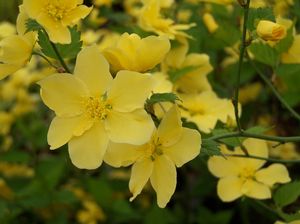Printed at http://www.quackingrassnursery.com/index.cfm/
Kerria japonica 'Pale Moon'
Japanese Kerria
Plant Type:
DECIDUOUS SHRUBSKerria japonica ‘Pale Moon’ (ex: Nickou) – 'Pale Moon' came to us from the extraordinary gardens of Nick Nickou in Branford, Connecticut. ‘Pale Moon’ was found as a branch sport with a lovely display of extra-large single soft sulfur yellow flowers adorning green stems in beautiful contrast with deep dark green foliage and stems. Soft sulfur yellow is a curious color – you may couple it with any other color and the combination works: hard red and pale yellow? It works! Purple and light yellow? Beautiful! Soft pale yellow with orange or deep blue or rose pink? Yum! 'Pale Moon' has proven to be an extraordinarily robust growing shrub exhibiting four seasons of interest.
Characteristics and Attributes for Kerria japonica 'Pale Moon'
Season of Interest (Flowering)
- Spring
Season of Interest (Foliage)
- Spring / Summer / into Autumn
Interesting Bark
- Colored
Nature Attraction
- Deer Resistant
Light
- Morning Sun / Afternoon Shade
- Mostly Sunny
Attributes
- Hedgerow
- Massing
- Foundation
- Specimen
- Shrub Border
- Hedge
Growth Rate in the Garden
- Moderately Fast
Soil
- Draining
- Fertile
Origins
- Garden Origin
Propagated By
- Cutting Grown
Genus Overview: Kerria
Common Name: Japanese Kerria
Japanese Kerria prefers a fertile soil condition in more sun than not. Its winter branches retain the green color of summer. And though it is wild-haired and rangy in the winter landscape it can be employed smartly in a mixed hedgerow or as dynamic counterpoint, a wild-haired tousle placed against taller shrubs with a natural formal growth habit or even set before a hedge comprised of pruned “soldiers in a row”. The member of the Rosaceae originates in Western to Central China and the mountains of Japan. They are happiest in part sun planted in fertile moisture retentive to draining soils. This genus hales from central China and Japan. All of the following selections are cutting grown.



